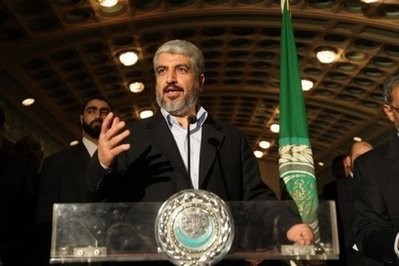Palestinian factions signed a reconciliation deal in Cairo on Tuesday to end the divide between the West Bank and Gaza and hold elections in a year in an agreement Israel called a blow to peace.
Representatives of 13 factions, including Palestinian president Mahmud Abbas's Fatah party and its rival Hamas, as well as independent political figures, inked the deal following talks with Egyptian officials.
"All the Palestinian factions signed the document at a meeting with Egyptian intelligence officials," Bilal Qassem, politburo member of the Palestine Liberation Organisation (PLO), told AFP.
He said all factions were given the opportunity to discuss the document and air any reservations.
"We signed the deal despite several reservations. But we insisted on working for the higher national interest," said Walid al-Awad, a politburo member of the leftist Palestine People's Party.
"We have discussed all the reservations. Everyone has agreed to take these points into consideration," he told Egyptian state television without elaborating.
The agreement was immediately denounced by Israeli Prime Minister Benjamin Netanyahu as "a hard blow to peace process."
Netanyahu's call on Abbas to cancel the agreement was denounced as "unacceptable interference" by the head of Fatah's delegation, Azzam al-Ahmed.
Ahmed said the factions will work on forming the new government after an official ceremony in Cairo on Wednesday that will be attended by Egyptian Foreign Minister Nabil al-Arabi, Muwafi and Arab League chief Amr Mussa.
Abbas, who arrived in Cairo on Tuesday evening, and Hamas chief Khaled Meshaal will also be present.
Abbas said Israel does not wish to see the Palestinians united because it thrives on their divisions.
"There are no guarantees for the success of the agreement, which has many enemies and there are attempts to undermine the agreement from several parties," Abbas said during a visit to the Al-Ahram newspaper.
"Despite the fact that there are no guarantees to make this agreement successful there is a will and a way to agree," he said.
"It is not required of Hamas to recognise Israel. We will form a government of technocrats and we will not ask Hamas to recognise Israel," he added.
The deal, which was announced last week, comes after 18 months of fruitless talks. It envisages the formation of an interim government of independents that will pave the way for presidential and parliamentary elections within a year.
Maher al-Taher, a politburo member of the leftist Popular Front for the Liberation of Palestine, told AFP Egyptian officials had "promised to take into consideration all reservations expressed during the signing."
Israel had heavily criticised the agreement, refusing to deal with any government that includes Hamas, which it and the United States black list as a terrorist organisation.
But Palestinian officials said the new government's role will be to manage affairs in the Palestinian territories, while the PLO, of which Hamas is not a member, will remain in charge of peace talks with Israel.
"The government's role is limited to administrative affairs dealing with the lives of Palestinians in the West Bank and the Gaza Strip," Azzam al-Ahmed said on Monday.

"But all political matters including negotiating the peace process will remain the responsibility of the PLO," he said.
Among the first tasks to be tackled is the establishment of a higher security council tasked with examining ways to integrate Hamas and Fatah's rival security forces and create a "professional" security service.
The accord also calls for the creation of an electoral tribunal and for the release of a number prisoners held by the rival movements in jails in the West Bank and Gaza.
Fatah and Hamas have been bitterly divided since June 2007 when Hamas took over the Gaza Strip, routing Fatah loyalists in bloody confrontations that effectively split the Palestinian territories in two.
The reconciliation deal marks a diplomatic coup for Egypt's new government, 11 weeks after president Hosni Mubarak was toppled in a popular revolt.
Cairo had tried for more than a year to mediate between Fatah and Hamas but its efforts fell flat.
























